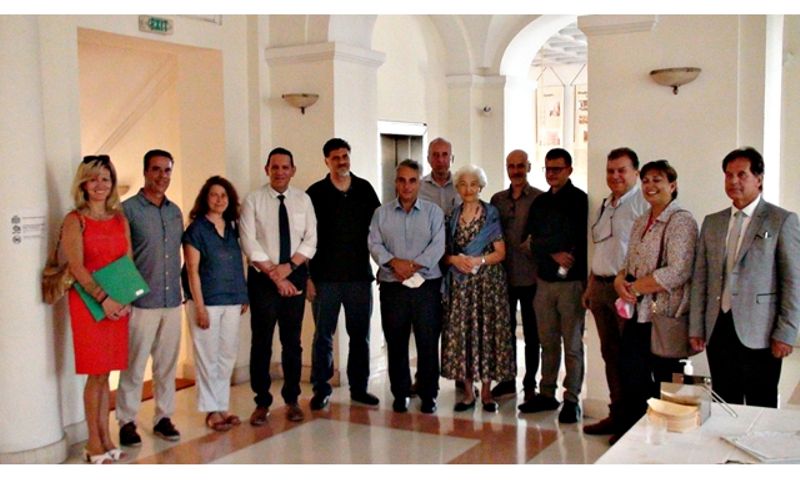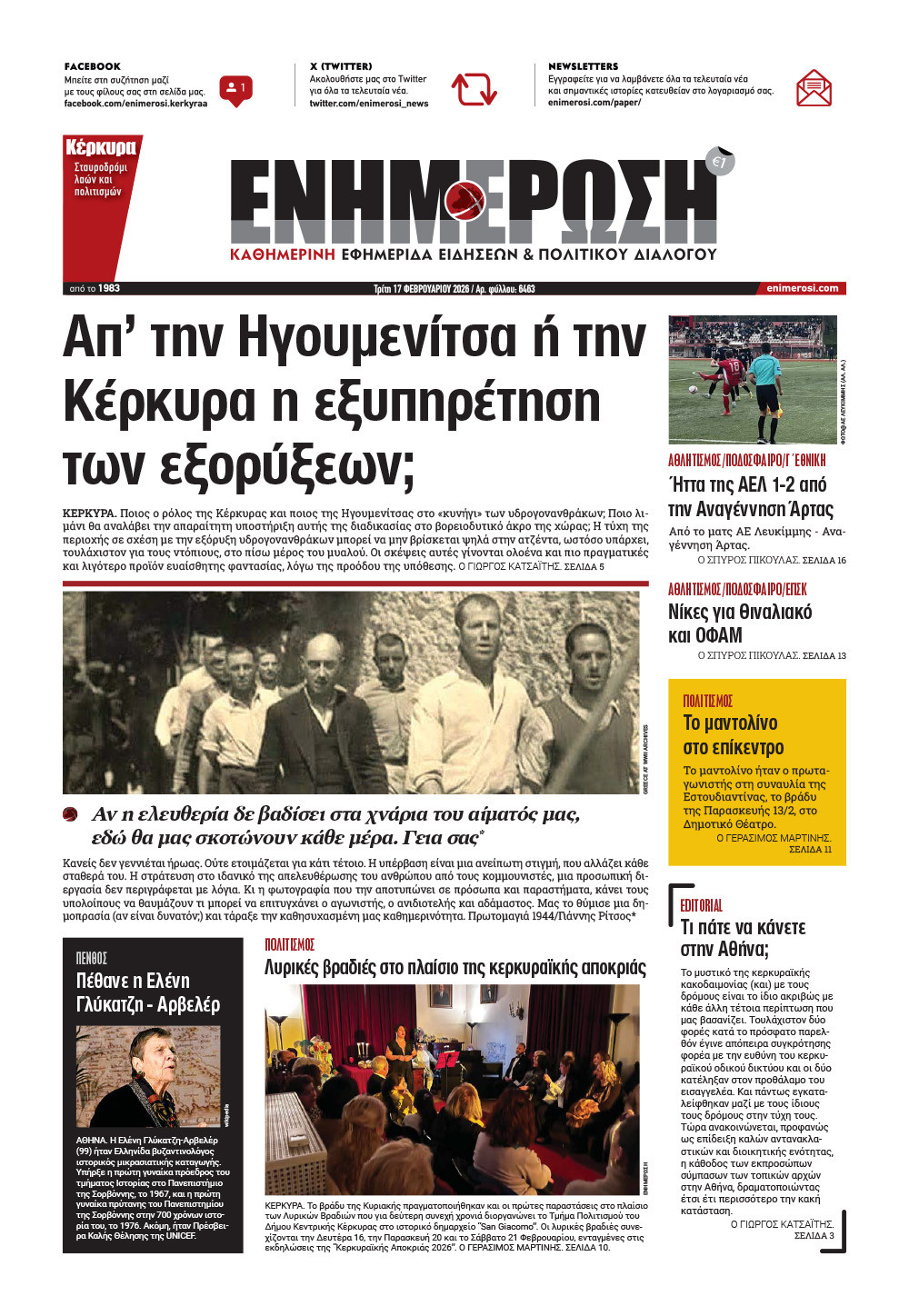94 COVID deaths at Corfu Hospital since beginning of pandemic

COVID-19
28 Jun 2022
/ 09:38
CORFU. The Head of the Pulmonary Clinic presented relevant data at the ΄COVID-19 Pandemic΄ seminar on Saturday.
The number of patients hospitalised in Corfu Hospital Covid Unit has been growing gradually with the recent spike and the number of daily infections on the island has been over 200.
On Sunday, a 75-year-old woman who had been hospitalised in the Covid Unit died. According to hospital sources, there were 19 COVID patients yesterday, including foreign nationals - 16 in the Special Infectious Diseases Unit and three in the Paediatric Clinic. There is no special concern about their condition and there has been no need so far to transfer anyone to the ICU.
With the recent spike in infections in Corfu, experts are advising people to strictly observe the protection measures and use masks wherever there are a lot of people, indoors and wherever it is mandatory - in public transport, pharmacists and health facilities.
94 deaths
The Head of the Pulmonary Clinic Elias Papanikolaou presented significant data from Corfu since the beginning of the pandemic at the ΄COVID-19 Pandemic΄ seminar on Saturday.
He said that the fatality rate at Corfu General Hospital was 7%. 94 deaths of patients were recorded, with a median age of 86 and the vast majority of them suffered from incurable diseases such as malignancies of solid organs, haematological malignancies and final-stage neurological, cardiac and pulmonary diseases. He added that over the two years of the pandemic over 1,600 patients have been hospitalised, of which some instances were suspect and under investigation and the confirmed instances were 1,320.
"The Special Infectious Diseases Unit has 30 beds available but during the fourth wave in the autumn and winter of 2021 a second unit was set up in the Pulmonary Clinic taking the number of beds up to 60," he said. "Until the hospital was properly equipped with PCR and the other necessary equipment, four patients were transferred to Ioannina at the beginning of the pandemic. After June 2020, only one patient was transferred elsewhere, for whom an urgent angiography was required. All the other cases remained hospitalised in Corfu."
Dr. Papanikolaou made special reference to a 35-year-old Serbian patient who was hospitalised for one and a half months, whose condition was considered to be one of the most serious at the hospital. He said that the patient paid a visit to the hospital a few days ago to thank all the doctors.
Post-COVID
Dr. Papanikolaou said that there were seven pulmonologists and three nurses on each shift in the Special Infectious Diseases Unit. Up to now, 80 patients have been examined at the hospital's post-COVID department, with the most frequent morbities being asthma and apnea during sleep, but, he added, there are only a few who still have significant damage and serious restrictive syndromes - he said the figure was less than 10%.
"Pulmonary functions are gradually being restored without therapy," he said. "Two patients have completed the programme of pulmonary rehabilitation. COVID-19 is a systemic disease which affects each patient in a different way and we can now recognise that genetically. The new variants are probably connected with the most severe disease and require clinical criteria to deal with them as there are many possible causes for them to become more severe."
The seminar was organised by the Ionian Academy, Corfu Surgical Association and the Ionian University on the occasion of Corfu Surgical Association's 125th anniversary.
On Sunday, a 75-year-old woman who had been hospitalised in the Covid Unit died. According to hospital sources, there were 19 COVID patients yesterday, including foreign nationals - 16 in the Special Infectious Diseases Unit and three in the Paediatric Clinic. There is no special concern about their condition and there has been no need so far to transfer anyone to the ICU.
With the recent spike in infections in Corfu, experts are advising people to strictly observe the protection measures and use masks wherever there are a lot of people, indoors and wherever it is mandatory - in public transport, pharmacists and health facilities.
94 deaths
The Head of the Pulmonary Clinic Elias Papanikolaou presented significant data from Corfu since the beginning of the pandemic at the ΄COVID-19 Pandemic΄ seminar on Saturday.
He said that the fatality rate at Corfu General Hospital was 7%. 94 deaths of patients were recorded, with a median age of 86 and the vast majority of them suffered from incurable diseases such as malignancies of solid organs, haematological malignancies and final-stage neurological, cardiac and pulmonary diseases. He added that over the two years of the pandemic over 1,600 patients have been hospitalised, of which some instances were suspect and under investigation and the confirmed instances were 1,320.
"The Special Infectious Diseases Unit has 30 beds available but during the fourth wave in the autumn and winter of 2021 a second unit was set up in the Pulmonary Clinic taking the number of beds up to 60," he said. "Until the hospital was properly equipped with PCR and the other necessary equipment, four patients were transferred to Ioannina at the beginning of the pandemic. After June 2020, only one patient was transferred elsewhere, for whom an urgent angiography was required. All the other cases remained hospitalised in Corfu."
Dr. Papanikolaou made special reference to a 35-year-old Serbian patient who was hospitalised for one and a half months, whose condition was considered to be one of the most serious at the hospital. He said that the patient paid a visit to the hospital a few days ago to thank all the doctors.
Post-COVID
Dr. Papanikolaou said that there were seven pulmonologists and three nurses on each shift in the Special Infectious Diseases Unit. Up to now, 80 patients have been examined at the hospital's post-COVID department, with the most frequent morbities being asthma and apnea during sleep, but, he added, there are only a few who still have significant damage and serious restrictive syndromes - he said the figure was less than 10%.
"Pulmonary functions are gradually being restored without therapy," he said. "Two patients have completed the programme of pulmonary rehabilitation. COVID-19 is a systemic disease which affects each patient in a different way and we can now recognise that genetically. The new variants are probably connected with the most severe disease and require clinical criteria to deal with them as there are many possible causes for them to become more severe."
The seminar was organised by the Ionian Academy, Corfu Surgical Association and the Ionian University on the occasion of Corfu Surgical Association's 125th anniversary.












